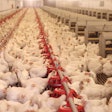Elizabeth Doughman, editor, WATT PoultryUSA and Poultry Future: Hello and welcome to WATT Poultry Chat. I'm Elizabeth Doughman, the editor of WATT PoultryUSA and Poultry Future.
Today’s Watt Poultry Chat is brought to you by MGK. MGK manufactures a comprehensive line of insecticides designed to control bed bugs, darkling beetles, flies and other insects that impact your poultry operation. Learn more at www.mgk.com.
Joining us today is Tommy Powell, eastern technical field representative at MGK.
Thanks for joining us, Tommy.
Should producers feel embarrassed about a bed bug infestation, and what effects can bed bugs have on both poultry and employees in a facility?
Tommy Powell, eastern technical field representative, MGK: Absolutely not. Bed bugs are actually a very old insect. I know people don't talk about this, but they've been on this planet since the dinosaurs were here – so a long time. In fact, the first recorded treatment for bed bugs was in 1690.
People have been dealing with bed bugs forever and issues with bed bugs are mostly stress. They're a public health pest, but they're not known to spread any disease. It's mostly stress either with your employees or with poultry. When a bird is stressed out, their production can suffer. That's the main issue is bed bugs causing a lot of stress and anxiety for people and for birds.
Doughman: How many bed bugs are needed to spark an infestation, and why is it critical to take swift action once they are detected?
Powell: That's a great question. A lot of people think it takes a lot of bedbugs to start an infestation. But actually, it's a single bedbug.
All it needs is one pregnant female, and she can start an entire infestation. When she mates, she's actually storing DNA. She doesn't have to mate again. What she does is she mates, she stores DNA and then she gets a blood meal. When she gets her blood meal, she can produce eggs. And then she doesn't need to find another male. All she needs to do is get another blood meal. And she can keep doing that until we have a population of bed bugs.
What's so critical about catching it quickly is the way a bed bug develops from egg to adult is that every stage of life needs blood. Let's say you get bedbugs at your house. You might move around. Well, to the bedbug, you're the food, right? You're the blood. You're limiting their ability to develop. When you're moving around, they don't have that blood, and they need that blood to go from one stage to another.
In a poultry house, a chicken doesn't care. A chicken will sit there and let the bedbugs feed on them. And there's lots of blood and they're able to go from egg to adult in 30 days. If you think about that, every month, your population in your poultry house can go from a handful of bed bugs to twice as many, to three times as many. And it just keeps getting bigger and bigger every month.
The problem is typically when we're talking about control, it's when chickens are out of the house. You've got that short window. And if you don't catch it early and you put birds back in the house, you could go another year and populations can get out of hand.
Doughman: What are the best ways to control bed bugs?
Powell: Bed bugs can be controlled by insecticides, that's good news. Bad news is that for every population out there, there's been some type of resistance to every chemical that you could possibly use for bed bugs. What we've discovered in the professional pest control market is that it is best to use a product with two types of chemicals in there – two distinct mode of actions – because what we haven't found is that bed bugs are resistant to two things at the same time.
If you're curious about what a mode of action is, I did a WATT Poultry Chat before about mode of action. You can go check that out. But it's not just the name of the chemical. It's how it kills the bug. So that's what you need.
Doughman: Is it possible to prevent bed bugs proactively in poultry houses? If so, how?
Powell: That's a great question. MGK has done a lot of work on controlling bed bugs. If you talk to your MGK sales reps, what you can see is we've created this detailed protocol.
It is very important to directly treat them going in and with a boom sprayer. Treating everywhere is not ideal, but they're in cracks and crevices. When the chickens are gone out of the house they're going to hunker down in a little spot. They're just going to stay there, so really targeting where they're going to stay is important. A lot of trail trial and error on myself going out and failing and learning from those failures. We have a great protocol that you can ask MGK for.
To prevent them, what we know is bed bugs are hitchhikers. They will come in on purses, bags, things like that. They're attracted to heat. They like heat because heat is food to them. You produce heat, but they don't like to be close to your skin. Like a tight-fitting shirt like this, they're not going to be on that. Now, if I was wearing a jacket over this shirt, they could be on a jacket, bringing it into your house. But typically it comes in on a purse, a bag, things like that.
When you're looking at people bringing stuff into your poultry houses, you should inspect them. Bed bugs are about the size of an apple seed. You can see it from a distance, totally different than a red mite or something that you really have to look at closely. They're pretty fast.
They're about the size of an apple seed. When you see something like that, you should be concerned. Get a sample of it. You know you need to take a look at it and make sure it's not a bed bug.
When somebody's bringing stuff into your facility, nets, fans, stuff like that to catch the birds at the end of life, you should take a look at that kind of equipment because that's how bed bugs are brought in.
If somebody's in a facility, a worker has bed bugs at their home or somebody's in a facility with bed bugs and they bring stuff into your poultry house, that's how you got bed bugs in the first place.
Being diligent about looking at what's coming into the poultry house, that that is the key to preventing them.
Doughman: Thank you so much for sharing these insights. For more information on the solutions discussed here today, visit MGK at www.mgk.com.
Thanks again, Tommy, and thanks to you for tuning in.

















